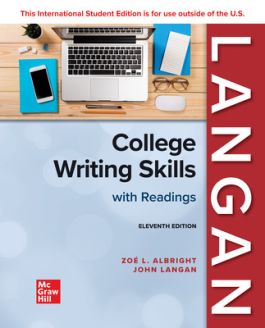College Writing Skills with Readings ISE
11th Edition
1265226598
·
9781265226596
© 2023 | Published: January 14, 2022
College Writing Skills with Readings, 11th edition, emphasizes writing skills as well as process. By identifying a set of 4 fundamental skills critical to effective writing, College Writing Skills with Readings encourages students to see writing as a…
Read More
Request Review Access
Receive via shipping:
- Colour, print bound version of the complete text
Part 1 – Essay Writing
1. An Introduction to Writing
2. The Writing Process
3. The First and Second Steps in Essay Writing
4. The Third Step in Essay Writing
5. The Fourth Step in Essay Writing
6. Four Bases for Revising Essays
7. Developing an Essay
Part 2 – Patterns of Essay Development
8. Description
9. Narration
10. Exemplification
11. Process
12. Cause and/or Effect
13. Comparison and/or Contrast
14. Definition
15. Division-Classification
16. Argument
Part 3 – Researching, Writing and Documenting
17. Information Literacy
18. Summarizing and Paraphrasing
19. Writing a Source-Based Essay
20. Writing a Research Essay
Part 4 – Handbook of Sentence Skills
Section I – Grammar
21. Subject and Verbs
22. Fragments
23. Run-Ons
24. Regular and Irregular Verbs
25. Subject-Verb Agreement
26. More about Verbs
27. Pronoun Agreement and Reference
28. Pronoun Types
29. Adjectives and Adverbs
30. Misplaced Modifiers
31. Dangling Modifiers
Section II – Mechanics and Punctuation
32. Capital Letters
33. Numbers and Abbreviations
34. Apostrophe
35. Quotation Marks
36. Comma
Section III – Word Use
37. Commonly Confused Words
38. Effective Word Choice
Section IV – Tests
39. Editing Tests
Part 5 – Readings for Writers
Introduction to the Readings
Building Self-Awareness
Education and Learning
Challenging Societal Values
Index
Instructor’s Guide
1. An Introduction to Writing
2. The Writing Process
3. The First and Second Steps in Essay Writing
4. The Third Step in Essay Writing
5. The Fourth Step in Essay Writing
6. Four Bases for Revising Essays
7. Developing an Essay
Part 2 – Patterns of Essay Development
8. Description
9. Narration
10. Exemplification
11. Process
12. Cause and/or Effect
13. Comparison and/or Contrast
14. Definition
15. Division-Classification
16. Argument
Part 3 – Researching, Writing and Documenting
17. Information Literacy
18. Summarizing and Paraphrasing
19. Writing a Source-Based Essay
20. Writing a Research Essay
Part 4 – Handbook of Sentence Skills
Section I – Grammar
21. Subject and Verbs
22. Fragments
23. Run-Ons
24. Regular and Irregular Verbs
25. Subject-Verb Agreement
26. More about Verbs
27. Pronoun Agreement and Reference
28. Pronoun Types
29. Adjectives and Adverbs
30. Misplaced Modifiers
31. Dangling Modifiers
Section II – Mechanics and Punctuation
32. Capital Letters
33. Numbers and Abbreviations
34. Apostrophe
35. Quotation Marks
36. Comma
Section III – Word Use
37. Commonly Confused Words
38. Effective Word Choice
Section IV – Tests
39. Editing Tests
Part 5 – Readings for Writers
Introduction to the Readings
Building Self-Awareness
Education and Learning
Challenging Societal Values
Index
Instructor’s Guide
College Writing Skills with Readings, 11th edition, emphasizes writing skills as well as process. By identifying a set of 4 fundamental skills critical to effective writing, College Writing Skills with Readings encourages students to see writing as a skill that can be learned and a process that must be explored. These 4 skills, or bases, for effective writing are as follows:
Unity: Discover a clearly stated point, or topic sentence, and make sure that all other information in the paragraph or essay supports that point.
Support: Support the points with specific evidence, and plenty of it.
Coherence: Organize and connect supporting evidence so that paragraphs and essays transition smoothly from one bit of supporting information to the next.
Sentence skills: Revise and edit so that sentences are error-free for clearer and more effective communication.
These four bases are essential to all effective writing, whether it be a narrative paragraph for a personal journal, a cover letter for a job application, or an essay for an academic assignment.
Unity: Discover a clearly stated point, or topic sentence, and make sure that all other information in the paragraph or essay supports that point.
Support: Support the points with specific evidence, and plenty of it.
Coherence: Organize and connect supporting evidence so that paragraphs and essays transition smoothly from one bit of supporting information to the next.
Sentence skills: Revise and edit so that sentences are error-free for clearer and more effective communication.
These four bases are essential to all effective writing, whether it be a narrative paragraph for a personal journal, a cover letter for a job application, or an essay for an academic assignment.

